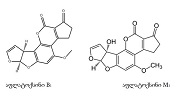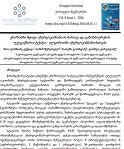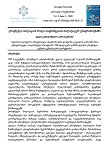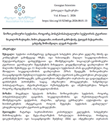About the teaching and guidance of the subject "Fundamentals of creative thinking"
Downloads
Today, in a rapidly changing environment in the whole world, many current problems require a timely response and an effective solution. For many of these problems, the previous approaches are no longer applicable or not applicable at all. In connection with this, the question of the development of qualitatively new, non-standard approaches is on the agenda for their decision, which is the goal of the field of creative thinking. It is natural that familiarization with achievements in the specified area, acquisition of relevant knowledge and mastery of skills should become one of the main directions of the education system not only in schools and universities, but constantly, at all stages of human activity. For several years, the subject "Basics of creative thinking" has been taught at the Faculty of Informatics and Management Systems of the Technical University of Georgia to students and graduate students of some departments, and as an optional discipline it is offered to a group of students who wish to study it from the entire faculty. When choosing the necessary materials for training, the authors of this article, first of all, familiarized themselves with advanced foreign experience in the specified area, in particular, with theories, approaches and recommendations of well-known specialists. However, we did not just copy and translate these materials, but adapted them to local conditions, and also introduced students to the results achieved by Georgian innovators. The results of these works are described in this article. Its purpose is to share with everyone the experience accumulated by the authors of the article over the years of reading subjects in this direction, as well as to discuss the problems that arise in this process and ways to eliminate them. Finally, as a result of the analysis and taking into account the recommendations of teachers and students, we strive to plan events for choosing ways to improve the content of the discipline according to creative thinking and the forms of its transfer to students. Along with this, the article pays attention to the textbook written this year for teaching the subject "Fundamentals of creative thinking", describing the main aspects of its structure and content. We note that subjects with such or similar names are taught in many universities and thousands of colleges around the world. And it can be said that the inclusion of this discipline in the curriculum of our universities was delayed (and in many places it has not happened yet). But, as they say: «Better late than never». Also, we consider it necessary that the subject "Basics of Creative Thinking" be read in secondary schools of the country after appropriate adaptation to the educational process initially in the pilot form of training.
Downloads
https://www.grafiati.com/en/literature-selections/decision-making-methods/journal/
http://www.ifapcom.ru/files/2016/UGRA_ENGL_BLOK_WEB.pdf
https://www.sciencegate.app/keyword/2257442
https://www.mathedu.ru/text/poya_kak_reshat_zadachu_1959/p5/
https://akvobr.ru/mitio_kaku_obrazovanie_budushego.html
გ. ღვინეფაძე, თ. შავიშვილი. „გადაწყვეტილების მიღების ეფექტიანობის ამაღლების გზები.“ თბილისი. სტუ-ს გამომცემლობა, „შრომები“, 2020, №1 (515), გვ. 80-93. ISSN 1512-0996.
გ. ღვინეფაძე, თ. შავიშვილი. „On-line სახელმძღვანელოების დაპროექტების კონცეფცია“. თბილისი. სტუ-ს გამომცემლობა, „შრომები“, 2021, №1 (519), გვ. 40-54. ISSN 1512-0996.
გ. ღვინეფაძე, თ. შავიშვილი. “ინტერდისციპლინური მიდგომების ეფექტიანობა მეცნიერული კვლევებისა და სწავლების პროცესებში”. 2021. მაისი. მართვის ავტომატიზებული სისტემების კათედრის დაარსებიდან 50-ე წლისთავისა და მისი დამაარსებლის, აკადემიკოს გოჩა ჩოგოვაძის 80 წლის იუბილესადმი მიძღვნილი საერთაშორისო სამეცნიერო კონფერენცია „საინფორმაციო საზოგადოება და განათლების ინტენსი¬ფიკაციის ტექნოლოგიები“. სტუ, „შრომები, მართვის ავტომატიზებული სისტემები“, 2021. №1 (32), გვ. 316-319. ISSN 1512-3979.
გელა ღვინეფაძე - ტრანს- და ინტერდისციპლინური მიდგომები პრობლემების გადასაწყვეტად. II საერთაშორისო სამეცნიერო კონფერენცია ,,საქართველო და ევროინტეგრაცია“. სტუ, სტატიების კრებული, 29-30 სექტემბერი 2022. გვ. 114-122.
https://drive.google.com/file/d/1Bxge5mIXd-6LgEnfMQUiNR2mp2RmV5dF/view
Copyright (c) 2024 Georgian Scientists

This work is licensed under a Creative Commons Attribution-NonCommercial-NoDerivatives 4.0 International License.


























































































































































































































